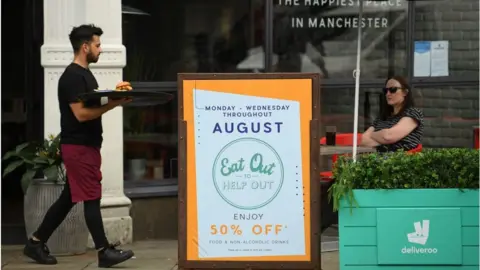Firms say government price cut plan 'slap in face'
 Getty Images
Getty ImagesA new government campaign asking businesses to cut prices to help with living costs has been branded a "slap in the face" for small firms.
The Federation of Small Businesses said asking struggling companies to "soak up additional costs just isn't realistic".
It's one of a number of groups who have criticised the plan for a taxpayer-funded ad campaign which involves firms slashing product prices from July.
The government will be rolling out an official name with branding "shortly".
David Buttress, the government's new cost of living tsar, has proposed the ad campaign, but a government source told the BBC that businesses will not be handed any subsidies or funding in order to cut prices.
Martin McTague, national chair of the FSB, said most small firms were "well beyond the point of being able to absorb extra costs without passing them on, which is often a last resort".
"It's a slap in the face for government to spend the extra tax it is raising from businesses on state-run marketing campaigns - doubtless focused on big businesses with corporate offers that can now be rebranded as helping the cost of living crisis, and so boost their sales," he told the BBC.
"Asking this group to soak up additional costs just isn't realistic, especially when so many are worried about basic survival, and have already cut all expenses, even necessary ones, to the bone."
Mr McTague argued there was "much more the government could do to help", such as reducing VAT rates to lift more small firms out of business rates, "rather than just a marketing campaign using taxpayer resources to put government branding in shop windows".
In response, the government said bringing in Mr Buttress on an unpaid basis was "the latest step taken by the government to ensure we're doing everything we can to help people in this country with the rising cost of living".
"He will work in partnership with the private sector to identify, develop and promote new and existing business-led initiatives that support people by encouraging businesses to do more to highlight discounted prices or product offers," a spokesperson said.
Prices are rising at their fastest rate for 40 years, with UK inflation - the rate at which prices increase - at 9.1%, the highest since March 1982. It is pushing people to cut back on food shopping and car journeys, due to record-high fuel prices, to save money.
'Tinkering'
The boss of Wetherspoons, Tim Martin, said the campaign proposal was a "classic example of tinkering, instigated by ministers who really don't understand money".
"The main economic critique of this government is that it doesn't have an overarching plan, but just reacts to events, like a doctor who only treats symptoms, not the cause," he added.
Mr Martin, a vocal supporter of Brexit, said eliminating tariffs on non-EU imports "such as bananas, rice, coffee and children's clothes and shoes" would "immediately reduce shop prices and inflation".
The British Independent Retailers Association (Bira) said asking small retailers to reduce prices was a "flawed idea".
"Supply chain inflation has been ahead of consumer inflation for some time, and as a result independent retailers have been operating on reduced margins by suppressing the retail prices," said Bira chief executive Andrew Goodacre.
"We believe that government intervention is needed to reduce prices and stimulate demand, and the best way is to reduce VAT," he added.
Meanwhile, Kate Nicholls, chief executive of industry body UK Hospitality, said bars, hotels and restaurants were "already highly price competitive" while it was also facing "colossal input costs that make price reductions extremely difficult".
"Energy costs are up 74%, goods 55% and labour up 54%, for example," she said. "While government efforts to help consumers are always welcome, the reality is that just one in three hospitality businesses are now profitable."
In 2020, the government launched the "Eat Out To Help Out" scheme to support hospitality businesses - where diners got a state-backed 50% discount on meals and soft drinks up to £10 each on Mondays, Tuesdays and Wednesdays for a limited period.
The government provided funding to the hospitality businesses during this period to fund the discount.
 Getty Images
Getty ImagesDuncan Brewer, a partner in EY-Parthenon's consumer products and retail team, said price was "the single most important factor in how customers choose where they shop", adding retailers were "working exceptionally hard to give their customers the lowest prices possible".
"They will be aware that raising prices by more than is absolutely necessary to keep their businesses afloat at this time is a real risk," he added.
Helen Dickinson, chief executive of the British Retail Consortium, added many retailers were expanding their value ranges to keep the price of "essentials down and introducing discounts for vulnerable groups".
The CBI, which hosted Mr Buttress' speech, said it was "vital the government continues to focus on building business confidence" to help firms reduce the knock-on effects to consumers.
"Business will continue to work in partnership with the government to try and mitigate the impact of rising costs across the board," a spokesman added.
